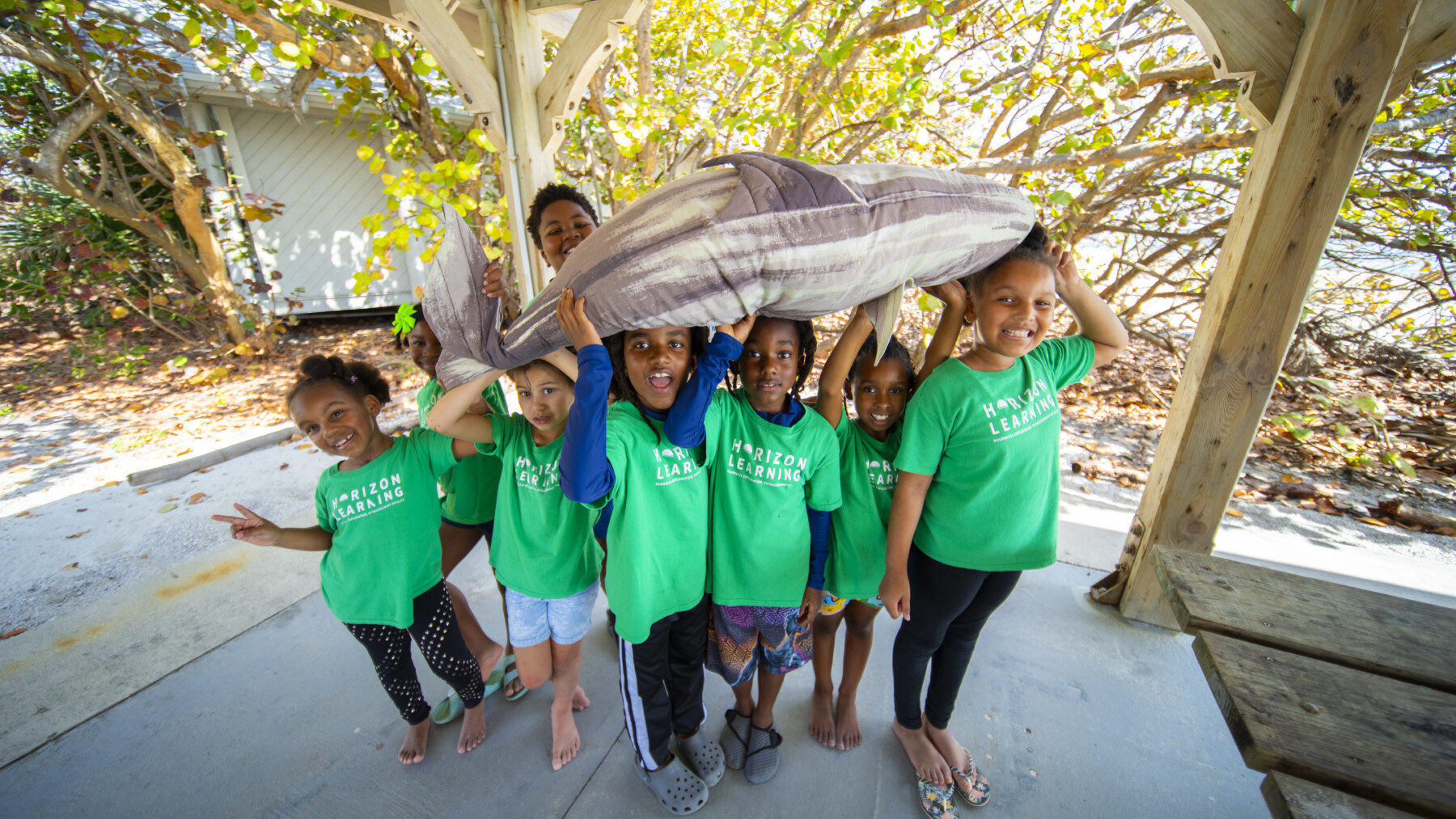
Horizon Learning microschool receive immersive science lessons at a la carte provider Saltwater Studies. Photo by Silver Media
Three decades ago, dozens of Black families in the Liberty City neighborhood of Miami enrolled their children in Florida’s first charter school. They didn’t know it, but they were kickstarting the most dramatic, statewide, educational shift for Black students in America.
Today, 140,000+ Black students in Florida are being educated outside district schools. They’re either in charter schools, in private schools using state choice scholarships, or outside full-time schools entirely using education savings accounts.
 More details on this overlooked migration can be found in a new brief co-authored by Black Minds Matter founder Denisha Allen and myself. It’s a quick update to our 2021 report, “Controlling the Narrative: Parental Choice, Black Empowerment & Lessons from Florida.”
More details on this overlooked migration can be found in a new brief co-authored by Black Minds Matter founder Denisha Allen and myself. It’s a quick update to our 2021 report, “Controlling the Narrative: Parental Choice, Black Empowerment & Lessons from Florida.”
Over the past decade, the number of Black students in Florida enrolled in non-district options grew 86%, to 142,384. That’s more than one in five Black students in the state. For context, 31 states have fewer Black students in their public schools than Florida has in these options.
The numbers are a strong rebuttal to those who claim choice is aimed at helping wealthy, white families.
They’re also a good indicator of what’s next.
As choice programs continue to expand across America, look for even more Black families, educators and communities to embrace them.
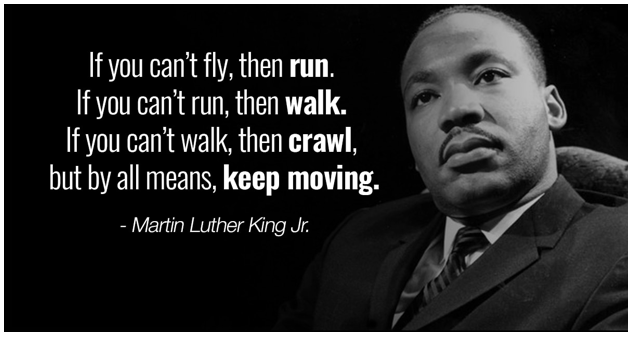 I read the new American Federation for Children/Step Up for Students study on choice for Black students in Florida, and found a bit of inspiration in the following charts:
I read the new American Federation for Children/Step Up for Students study on choice for Black students in Florida, and found a bit of inspiration in the following charts:
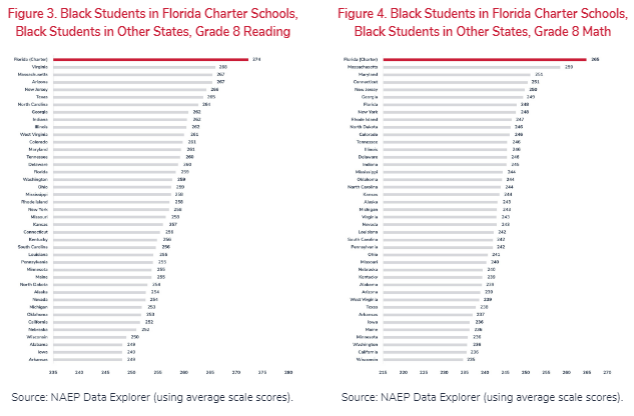 These charts compare the NAEP scores for Black students attending Florida charter schools to those of statewide averages for Black students. I asked myself, “Self, how would this look if we combined these two charts into one chart?”
These charts compare the NAEP scores for Black students attending Florida charter schools to those of statewide averages for Black students. I asked myself, “Self, how would this look if we combined these two charts into one chart?”
In the chart below, 10 points approximately equals an average grade level worth of work on these exams, so Florida charter students were looking good in 2019.
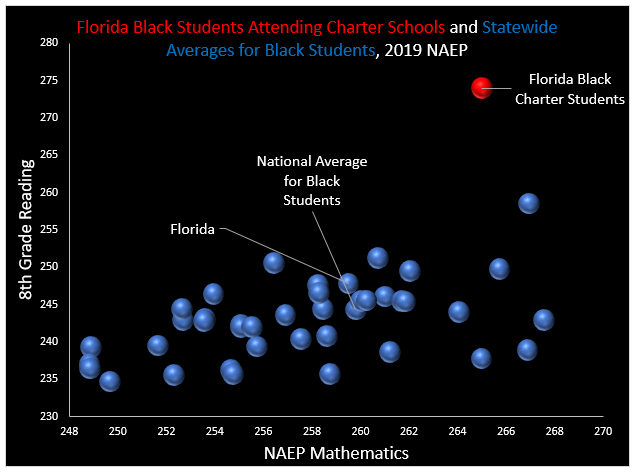 Next, I said to myself, “Self, what if we compared the scores of Florida Black charter school students to statewide averages for white students?”
Next, I said to myself, “Self, what if we compared the scores of Florida Black charter school students to statewide averages for white students?”
Here’s what that looks like:
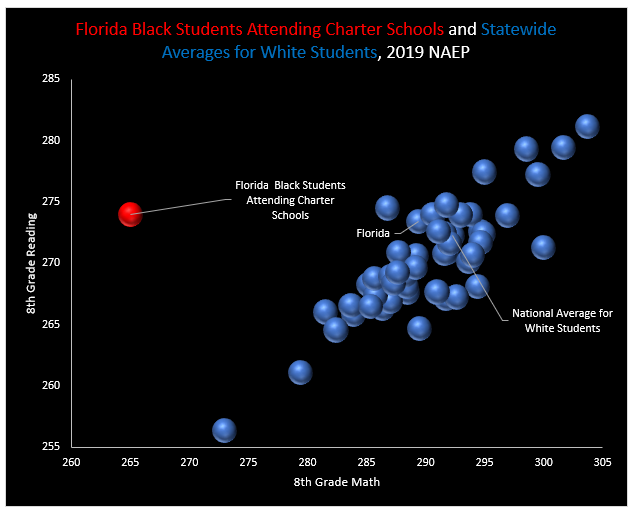 So, a couple of things to note: Florida’s Black charter students had a level of reading achievement similar to white students nationally as well as in Florida. Second, a large achievement gap remains in math.
So, a couple of things to note: Florida’s Black charter students had a level of reading achievement similar to white students nationally as well as in Florida. Second, a large achievement gap remains in math.
So, put it all together and it looks like this:
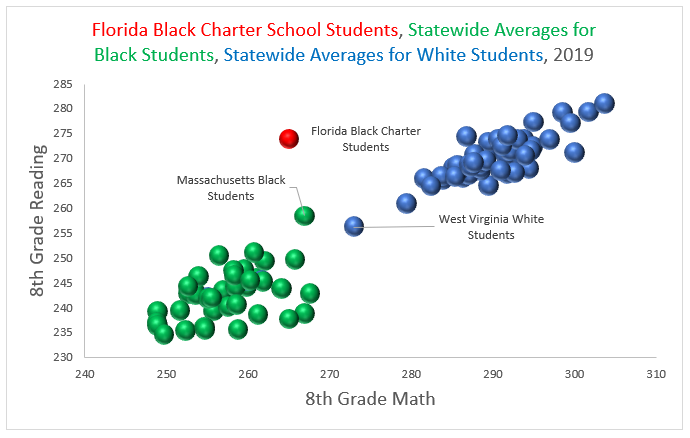 We clearly have a great many miles to go. Some will crawl, others will walk. Some, like Florida, relatively speaking, have been running.
We clearly have a great many miles to go. Some will crawl, others will walk. Some, like Florida, relatively speaking, have been running.
As Dr. King said: Keep moving.
The shift to an increasingly choice-driven education landscape for Black students in Florida has been driven by Black parents, who have enrolled their children in choice programs in growing numbers and made it so they cannot be ignored politically. “Options make it so that I can have school that works for my child,” said Brandi Evans, who has three children at Icon Preparatory School, a predominantly Black private school, pictured above, that is serving choice scholarship students in Tampa. With education choice, “I get to control the narrative.” PHOTO: Lance Rothstein
Editor's note: This special report was compiled by Denisha Merriweather, director of public relations and content marketing at the American Federation for Children; Dava Hankerson, director of enterprise data and research at Step Up For Students; Nathaniel Cunneen, communications associate at the American Federation for Children; and Ron Matus, director of policy and public affairs at Step Up For Students.
It has been 31 years since the first modern private school choice program began in Milwaukee, 29 years since the first charter school opened in Minnesota, and 10 years since Arizona created the nation’s first education savings account program.
Yet in many states, the opportunity for America’s 7.7 million Black public-school students to access these potentially life-changing learning options remains out of reach.
Florida is a notably bright exception.
Florida has more than 600,000 Black students, among the highest number of any state. It has among the most expansive suite of education choice options. And now it has among the highest number of Black students enrolled in those options.
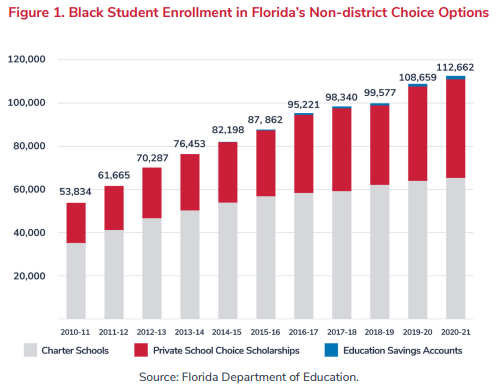
The number of Black students participating in Florida’s non-district choice options has more than doubled in the past decade. Proportionally, about 1 in 6 Black students in Florida is now enrolled in a private school via a choice scholarship or a charter school.
The latter shouldn’t be a surprise.
Black student achievement across America continues to lag. Black residents are more likely to have negative views of neighborhood schools. Black parents are particularly supportive of school choice.
Yet the extent to which Black parents, educators and communities have embraced choice in Florida has been little noticed by the press, policymakers and the general public, both in Florida and beyond.
This report – a joint effort between Black Minds Matter, the American Federation for Children, and Step Up For Students – seeks to spotlight those trend lines, and to highlight evidence of their positive impact on Black students.
It calls attention to Black educators who have been empowered by choice to innovate.
It also seeks to spur discussion in states where Black parents continue to have few meaningful choices.
Among the key takeaways:
To see the full report, click here.
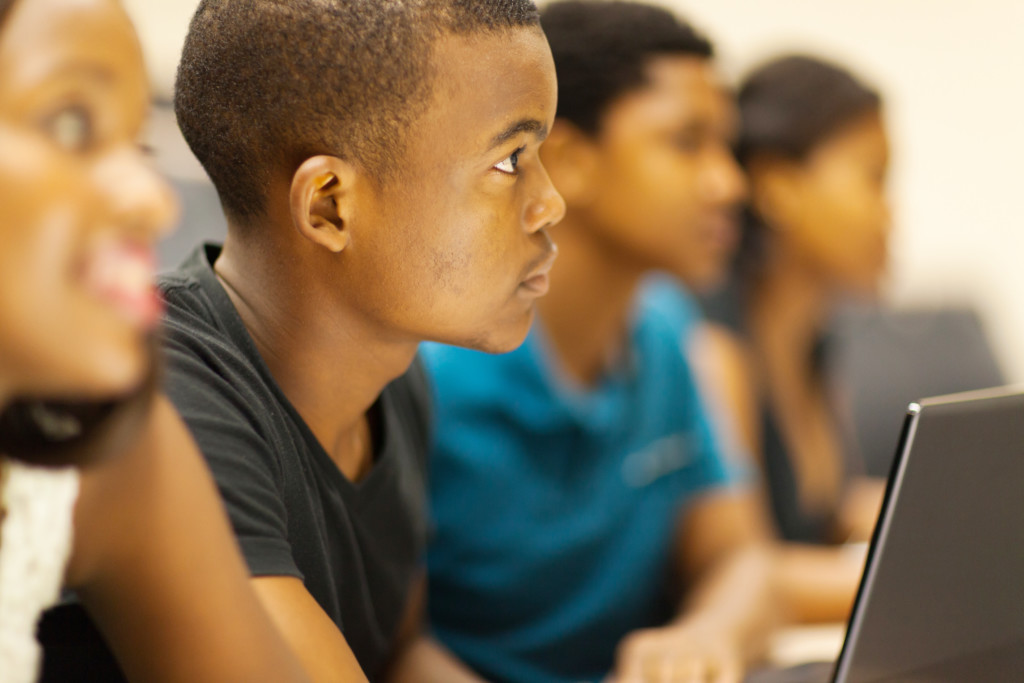 A recent article on The 74 noted the controversy over using the term “achievement gap” to describe learning disparities between Black and white students, with critics arguing that the education reform movement’s focus on “widespread, high-stakes standardized testing” heightens racial stereotypes.
A recent article on The 74 noted the controversy over using the term “achievement gap” to describe learning disparities between Black and white students, with critics arguing that the education reform movement’s focus on “widespread, high-stakes standardized testing” heightens racial stereotypes.
This is like blaming a thermometer for a fever while ignoring the virus that caused it – in this case, systemic racism and inequity in education. Giving families in underserved populations more choice in how and where to educate their children must be part of the cure.
Standardized testing can be a blunt instrument that fails to capture the individual circumstances of the learner or the inequity in the system, and too often emphasizes failure rather than student gains. However, we must have a standard by which we can measure learning across all spectrums.
While the article focuses on standardized testing as a measure that propagates racial bias, it barely mentions how few Black and low-income students graduate high school and the fact they get accepted to colleges at lower rates than their white peers.
However we define this “gap” in educational achievement, it remains that many of our nation’s children leave school without high school diplomas and basic reading, writing and math skills. The failures of the schools are not evenly distributed. They fall disproportionately on students of color and low-income families.
It permeates a mainstream school system that was never designed for these populations. Martin Luther King Jr. highlighted these inequities in 1967 when he said, “In elementary schools, Negroes lag one to three years behind whites, and their segregated schools received substantially less money per student than do the white schools.”
If we focus on the instrument that measures this disparity or on what we name it, but not on the inherent inequities in the system, we will continue to fall short of a real solution.
We can call it an achievement gap, or an opportunity gap as referenced in the article, but the results will remain the same.
We can debate whether it is based on race or income, but minority and low-income populations will still be prisoners of their ZIP codes.
We can talk about de jure segregation in the 1960s or de facto segregation today, but Black students will still experience systemic racism and inequity in education.
Income and racial disparities often are interconnected. In 2018, Black and Hispanic families made up 38% of families living in poverty compared to 18% of white and Asian families. Rather than blaming standardized testing and the use of the achievement gap as the reason why whites view Blacks as being inferior, we must decipher the root cause of why these inequities exist and how implicit biases permeate mainstream education.
Education choice is key to exposing and breaking those biases and inequities and helping students actualize their full potential. According to a 2019 Urban Institute study, the low-income students who received the Florida Tax Credit Scholarship were up to 20% more likely than public school students to earn bachelor’s degrees. Annual evaluations of the scholarship by the Florida Learning Systems Institute have consistently found that Florida’s most disadvantaged students have the same annual learning gains as all students of all income levels nationally.
Choice can have a positive impact on public schools, too. A study released earlier this year from the National Bureau of Economic Research found that benefits of the FTC scholarship went beyond students utilizing it. Researchers found that as the program expanded over the years, not only did lower-income, Black and Hispanic students benefit, but public schools most impacted by private school competition had higher test scores, fewer suspensions, and reduced absenteeism.
In The 74 article, Shavar Jeffries, head of the group Democrats for Education Reform, discussed his experience as a first-generation college graduate who received a full scholarship to Duke University. He lamented that he had to consistently inform people that he was on an academic scholarship, not an athletic scholarship. I understand where Jeffries is coming from. I also am a first-generation graduate who attended the highly regarded University of Florida and had to inform people that I was there for academics.
I owe my success to the true remedy for the virus of inequity in education: education choice.
Although I grew up as a recipient of the federal free and reduced-price lunch program, education choice afforded me the opportunity for cross-cultural immersion and an escape from the prospect of generational poverty. When I was still young, my teachers and parents praised my intellectual abilities and scores on standardized assessments despite my relegation to traditional courses that lacked rigor. This all changed when I applied for and was accepted into the International Baccalaureate program. It empowered me to see beyond my current situation and defy the stigma assigned to being a Black male student on free and reduced-price lunch.
At that time, there were not many choice options beyond public magnet schools, but the experience broadened my perspective. Today, there are magnets, charters, scholarship programs, vouchers and other choice programs available to students.
The adversary to progress for Black students is not the terminology used for analyzing standardized testing results, but rather the latent systemic racism that these tests reveal. Education choice gives them a way out of a system that for too long has worked against them.
In an effort aimed at boosting black student achievement, a new group is forming in Florida to develop a cadre of black entrepreneurs and executives to lead high-quality schools, including charter and private schools.
Black Floridians C.A.R.E. – which stands for Choice Advocates Reforming Education - is chaired by T. Willard Fair, a former chair of the state Board of Education and longtime leader of the Urban League of Greater Miami.
“It’s important because we believe that the rest of the battle for effectiveness and equality (in education) rests with us,” Fair told redefinED. “Why should I expect whites and Cubans to care about black children in Liberty City? It’s not their children.”
Fair said more black leaders in education - principals, owners, board members, chief executives - would galvanize support in the black community generally. But it’s especially critical for establishing deeper roots for school choice, he said.
“When you have a movement that comes out of the adults in the community, then it does not die,” said Fair, who co-founded Florida's first charter school in 1996 with former Gov. Jeb Bush. “Then the community says, ‘We have ownership of this.’ “
The group’s executive director is Isha James. She too has strong ties to school choice efforts, including stints at the Black Alliance for Educational Options, the National Association of Charter School Authorizers and Partners for Developing Futures, a social investment fund for people of color who want to open charter schools.
“Students who see people in power that look like them, they have higher aspirations,” James said. “I can’t continue to tell a child that he can be the principal of a school if the only thing he sees that’s ever looked like him is a janitor.”
Black Floridians C.A.R.E. will develop a leadership pipeline through training academies and mentoring programs, then serve as a conduit between black professionals and private, charter and district schools. James said primary recruitment efforts will be aimed not at educators, but at people with backgrounds in finance, law and business. (more…)
 Arkansas: A federal judge's ruling on the state's school choice law opens the door for legislative action on choice. (Arkansas News)
Arkansas: A federal judge's ruling on the state's school choice law opens the door for legislative action on choice. (Arkansas News)
Maine: Gov. Paul LePage and the newly formed Maine Charter School Commission are at odds over the pace of the commission's work. (Bangor Daily News)
Louisiana: More financial concerns surface about a private school that has drawn an unflattering spotlight to the state's new voucher program. (Monroe News Star) Meanwhile, state education officials are still considering how best to assess private schools that accept voucher students. (New Orleans Times Picayune.) And lawsuits over the voucher program begin to pile up. (Shreveport Times)
Pennsylvania: Lawmakers get set to consider school choice expansion in the form of more tax credit scholarships. (Harrisburg Patriot News) The Pittsburgh schools system is considering its own virtual school to win back students lost to cyber charter schools. (Pittsburgh Post Gazette)
Michigan: Black students in charter schools outperform their peers in traditional public schools, a study by a charter school support group finds. (MLive.com) (more…)
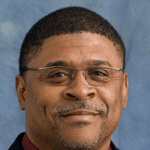 If you read the papers, you know the story. People who like vouchers and tax credit scholarships are right-wingers. They don’t like public schools. They’re corporate pawns.
If you read the papers, you know the story. People who like vouchers and tax credit scholarships are right-wingers. They don’t like public schools. They’re corporate pawns.
Now meet the Rev. Manuel L. Sykes.
He’s a Democrat. He’s president of the NAACP in St. Petersburg, Fla. He thinks public schools did a fine job with his kids.
Privatizing schools? Mention the idea to Sykes, who is pastor of Bethel Community Baptist Church, and you’ll get a slow burn about elitism, resegregation and crony capitalism.
But Sykes, 55, also supports vouchers and tax credit scholarships. And for folks who think they see a contradiction, he offers a quip and a laugh: “Stereotyping is a function of a lazy mind.”
Sykes isn't a leader in the school choice movement, but like thousands of others he quietly defies the story line. In that respect, he is symbolic of the new face of public education. It’s not public or private. It’s not liberal or conservative. It’s pragmatic.
“You can’t plant roses in every environment,” Sykes told redefinED. “You have to find the right environment for that flower. Or that orange tree. Or that apple tree. If we’re wise enough to know that with trees, why don’t we have the same common sense with children?” (more…)
They hold public schools in contempt. They think private schools are better. They want to privatize everything. Supporters of school choice, including vouchers and tax-credit scholarships, have long been defined by cartoonish stereotypes. And as a former education reporter for one of the biggest newspapers in the country, I know how hard it is to redefine story lines that are so set in stone, it doesn't matter how overwhelming the evidence is to the contrary.
Glenton "Glen" Gilzean Jr., the newest school board member in Pinellas County, Florida, the seventh biggest school district in Florida and the 24th biggest in the country, has a rare opportunity to chip away at those perceptions.
Appointed last month by Florida Gov. Rick Scott, Gilzean, 29, openly supports vouchers and tax-credit scholarships for low-income children, which makes him as rare among school board members as a mouse at a cat convention. We can't think of another sitting school board member in Florida who so openly supports private school choice options.
Believing that such options hold promise, of course, does not in any way mean easing up on other efforts to improve outcomes for children within public schools. For many school choice supporters, it has never been either/or. Gilzean can show that in coming months as he weighs in on all kinds of decisions affecting a sprawling district of 101,000 students. (more…)